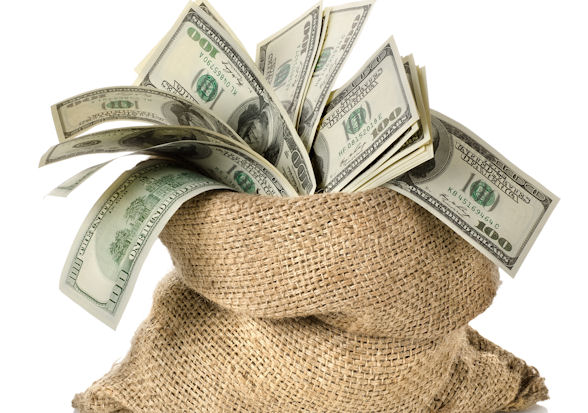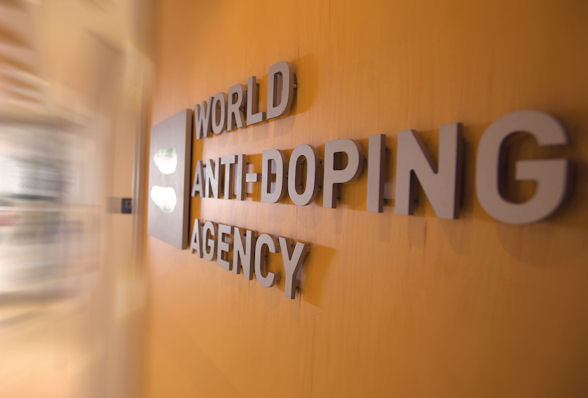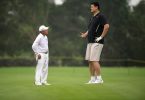This article first appeared in the Jan/Feb 2016 issue of WGM.
With FIFA about to vote in a new President following the departure of longterm leader Sepp Blatter and Russia pushing for a return to competition following the doping scandal that has rocked the athletics world, the next few months loom as arguably the most important in the history of sport when it comes to stamping out corruption.

As defining moments go, they don’t come much bigger than this. In just a few short months’ time, we will know for sure whether two of the world’s biggest sporting organizations – football’s governing body FIFA and the International Association of Athletics Federations (IAAF) – are serious about maintaining the integrity of the sports they represent.

FIFA, who spent years dodging allegations of corruption and shady back-room deals, is finally being held to account for its indiscretions following a United States FBI investigation leading to the arrest of a number of officials on charges of bribery, fraud and money laundering in May. Controversial President Sepp Blatter is also under investigation and with his successor to be elected in February, FIFA has a rare opportunity to clean out the ghosts of sins past.
![[b]Controversial FIFA President Sepp Blatter[/b]](http://www.wgm8.com/wp-content/uploads/2015/12/images_wgm_1039_fifa-to-cheat-or-not-to-cheat-2.jpg)
Likewise, repeated denials from the IAAF that athletics has a doping problem or that it isn’t doing enough to stamp the practice out now look decidedly flimsy following revelations that Russia had been running a state-sponsored athletics doping program during the 2012 London Olympics and beyond. The stunning findings of the World Anti-Doping Agency’s (WADA) 11-month investigation into the program, released in early November, has seen the Russian athletics team handed a provisional suspension through to March, however all eyes are now firmly fixed on the IAAF to see if they have the mettle to ban them from the 2016 Olympic Games in Rio de Janeiro in August.
It has already been suggested that Russia’s athletes could be allowed back in time for Rio if the Russian Anti-Doping Agency and associated sporting bodies can prove they have overhauled their anti-doping practices. If Russia is allowed back in, the track and field events – traditionally among the most popular of all Olympic sports – will be reduced to a laughing stock, lose all credibility and send a message that cheaters are allowed to prosper.
It’s not much different for FIFA, who have their own Russian problem to deal with. It has long been suspected that bribery and vote-buying played a key role in FIFA’s decision to award the 2018 World Cup to Russia, but Blatter seems to have saved the FBI some trouble by telling Russia’s state news agency TASS in October that members of FIFA’s Executive Committee had agreed to award the World Cup to Russia before voting had even taken place.
![[b]Jack Warner was one of a number of FIFA officials arrested in May 2015[/b]](http://www.wgm8.com/wp-content/uploads/2015/12/images_wgm_1039_fifa-to-cheat-or-not-to-cheat-3.jpg)
How can the footballing world, armed with the knowledge that the voting process was fundamentally flawed, be expected to watch Russia reap the rewards for this remarkable act of betrayal? The simple answer is: it can’t – which leaves FIFA with one more test of their credibility should they make it through February’s presidential election unscathed. Just as the IAAF must ban Russia’s athletes from the 2016 Olympic Games, Russia must be stripped of its right to host the 2018 World Cup.
And if such drastic actions seem harsh, let’s take a look at exactly how these two powerful sporting bodies managed to find themselves in this mess.
FIFA AND THE 2018 WORLD CUP
It’s fair to say that 2015 has been an eventful year in FIFA’s corridors of power. Since Swiss police swooped to arrest seven FIFA officials at the Hotel Baur au Lac in Zürich as they were preparing to attend the 65th FIFA Congress in May, a total of 18 individuals and two corporations have been indicted by US authorities including nine current FIFA officials.
The long list of charges against them include bribery, wire fraud, racketeering and money laundering and relate to a range of issues such as illegally influencing the awarding of media rights and sponsorship contracts, plus buying votes during the World Cup selection process and the 2011 FIFA presidential election.
![[b]Sheikh Salman bin Ebrahim al-Khalifa is a worrying contender to take over from Sepp Blatter as FIFA President[/b]](http://www.wgm8.com/wp-content/uploads/2015/12/images_wgm_1039_fifa-to-cheat-or-not-to-cheat-4.jpg)
They are by no means the only ones in the crosshairs and FIFA’s own ethics committee – a paradox if ever there was one – were recently forced to suspend Blatter, UEFA President Michel Platini and FIFA Secretary General Jérôme Valcke from their duties for 90 days while Swiss investigations continue.
But truth be told, the seeds of FIFA’s implosion were planted back in 1998 when Blatter was first appointed to the top job. It would be wrong to suggest the organization was squeaky clean before that point, but there is no doubt rumors of misconduct quickly gathered pace from that moment onwards – to the point where corruption has become inextricably entwined in FIFA’s very fabric.
The great frustration for football fans forced to watch on in bewilderment over the years has been the fact that, until the law finally stepped in a few months back, FIFA has effectively been a law unto itself. If there is one area in which FIFA excels even more than bending the rules it is clearing its members of any wrongdoing.
Blatter himself was the beneficiary of such an instance back in 2001 when it was revealed FIFA’s marketing partner ISL had made tens of millions of dollars in “payments” to FIFA officials under his watch. FIFA launched an internal investigation but their report found, “President Blatter’s conduct could not be classified in any way as misconduct with regard to any ethics rules. The conduct of President Blatter may have been clumsy … but this does not lead to any criminal or ethical misconduct.”
![[b]Michael Garcia's investigation into corruption allegations found serious faults with the 2018 and 2022 World Cup bidding process[/b]](http://www.wgm8.com/wp-content/uploads/2015/12/images_wgm_1039_fifa-to-cheat-or-not-to-cheat-5.jpg)
In 2006 it was Vice President Jack Warner getting a gentle slap on the wrist after he was found to have made almost US$1 million from illegally obtaining and re-selling tickets to the World Cup in Germany. Warner’s long list of dubious dealings also includes pocketing hundreds of thousands of dollars worth of charity donations meant for victims of Haiti’s earthquake, diverting millions of FIFA aid money into his own accounts rather than into developing football in the Caribbean as intended and refusing to pass proceeds from Trinidad’s 2006 World Cup finals appearance onto the players. To this day they still haven’t been paid!
Yet by far the greatest example of FIFA’s arrogance has come in the five years since they shocked the world by announcing Russia and Qatar as hosts of the 2018 and 2022 World Cups respectively.
Qatar’s selection was particularly surprising given that the tiny desert country has no footballing history to speak of and boasts summer temperatures of well over 40 degrees Celsius. FIFA itself even listed Qatar as either medium or high risk in almost every category of its official evaluation of Qatar’s bid in 2010, so it was inevitable that questions would be asked when they ultimately ignored their own report!
FIFA was quick to deny any wrongdoing but its cause wasn’t helped by the fact that two members of the Executive Committee – Amos Adamu of Nigeria and Reynald Temarii of Tahiti – were suspended before the final vote after being caught on tape requesting large payments in exchange for their backing. Bosses of England’s bid team, which lost out to Russia for the 2018 event, also claimed that four FIFA committee members had solicited bribes from them.

The best, however, was yet to come. In 2014, FIFA’s independent ethics investigator Michael Garcia concluded an exhaustive investigation into allegations of corruption regarding the 2018 and 2022 World Cup bids. He handed his 430-page report – which was highly critical of both the Russian and Qatar bids as well as the actions of the FIFA Executive Committee – to the governing body in September of that year along with a recommendation that the voting process should be completely overhauled and an eight year term limit applied to all Executive Committee members.
The “summarised” 42-page version FIFA released to the world was very different. Amended and published by the head judge of FIFA’s Ethics Committee, Hans-Joachim Eckert, it omitted all criticism of the Executive Committee and determined that any infractions committed by either Russia’s or Qatar’s bid teams were minor and therefore didn’t warrant any further investigation. It even went so far as to applaud both the Qatar bid team and Blatter himself for their cooperation during the investigation. Russia, for its part, was criticised for being uncooperative … their convenient excuse being that the rented computers they used during the bid process had since been destroyed!
![[b]WADA has recommended a lifetime ban for Russia's London Olympics 800 metre gold medalist Mariya Savinova[/b]](http://www.wgm8.com/wp-content/uploads/2015/12/images_wgm_1039_fifa-to-cheat-or-not-to-cheat-7.jpg)
No doubt in their own deluded minds FIFA believed that by officially finding themselves not guilty, the long-running saga surrounding the World Cup bidding process would finally be put to bed. The problem was that Garcia’s original report found no such thing and he wasn’t about to let the world believe it did.
Within hours of FIFA’s proud proclamation of innocence, Garcia released a statement of his own in which he accused the Eckhart report of “numerous materially incomplete and erroneous representations of the facts and conclusions detailed in the [original] report.”
It was later reported that FIFA’s culture of self-protection – particularly the amendments made to his Blatter observations – had convinced Garcia that meaningful reform was a hollow dream. He quit soon after with a warning to the world about FIFA that “No independent governance committee, investigator or arbitration panel can change the culture of an organization.”
![[b]Runner Tatyana Myazina was named as a drug cheat in a 2014 German documentary that exposed Russia's doping program[/b]](http://www.wgm8.com/wp-content/uploads/2015/12/images_wgm_1039_fifa-to-cheat-or-not-to-cheat-8.jpg)
The Garcia situation wasn’t all for nought however. At the very least it ensured any final thread of credibility remaining inside the halls of power were shredded once and for all. But more than that, it was the blatant contempt FIFA displayed for the entire footballing community – with Blatter and his cohorts seemingly oblivious to the transparency of their scheming – which ensured FBI investigations into their conduct kicked into overdrive.
The resulting arrests in Zurich finally proved too much for Blatter and after resisting countless calls to step down in the past he finally succumbed in June. The 79-year-old will officially step aside when his successor is elected in February 2016.
There still remain plenty of justifiable concerns for the game as to who will take Blatter’s place, with the final five candidates presenting a mixed bag on the credibility front. Our standout pick is Jordan’s Prince Ali Bin Al Hussein who has already demonstrated a progressive mentality and a desire for genuine reform. The youngest ever FIFA Vice President at 39, Prince Ali has been a strong supporter of women in football and was the man responsible for FIFA lifting its ban on Muslim women wearing jihabs while playing in 2010.
![[b]Ekaterina Poistogova won 800 metre bronze in London despite returning suspect samples in the lead-up[/b]](http://www.wgm8.com/wp-content/uploads/2015/12/images_wgm_1039_fifa-to-cheat-or-not-to-cheat-9.jpg)
He has previously outlined the need for greater transparency from the governing body and was one of the few inside FIFA to have pushed for Garcia’s full report to be made available to the public. Best of all, he is no friend of Blatter’s – having run against him at the previous election in early 2015. Prince Ali is by far the most likely of the five candidates to openly welcome a closer look at the 2018 and 2022 World Cup bids.
UEFA General Secretary Gianni Infantino threw his hat into the ring as a late replacement for the suspended Platini, but although he is well regarded in Europe the Swiss has already stated he will step aside should Platini be cleared to stand and doesn’t seem a serious contender.
A step down the ladder is former FIFA official Jérôme Champagne. A favorite of wine lovers around the world, Champagne is another to have claimed transparency and reform as his priorities although he was known to be very close to Blatter during his previous 11 year FIFA stint.
A more dubious candidate is South Africa’s Tokyo Sexwale. His strong business background and a history of campaigning against racism are noteworthy attributes, but he is another with close ties to Blatter and there are question marks surrounding some of his past dealings.
![[b]WADA boss Dick Pound[/b]](http://www.wgm8.com/wp-content/uploads/2015/12/images_wgm_1039_fifa-to-cheat-or-not-to-cheat-10.jpg)
And finally we come to Asian Football Confederation President Sheikh Salman Bin Ebrahim Al Khalifa of Bahrain, who is considered a huge chance of succeeding Blatter thanks to the support of the Asian Football Confederation he already presides over.
If Sheikh Salman does prove successful we might as well pack our bags and jump on the first rocket to the moon, for FIFA’s fate will be sealed. That he even made it onto FIFA’s list of approved candidates is cause for concern, with the election committee’s integrity checks “finding no grounds to disqualify his candidacy.”
This is despite the fact that he has been accused of multiple human rights violations in Bahrain including alleged ties to the arrest and torture of anti-government protestors in 2011. Perhaps the election committee recognized a kindred spirit after learning he has previously been suspected of vote-buying and election rigging?
And let’s not forget the fact that Blatter himself was instrumental in Sheikh Salman’s rise to the top of Asian football with the pair forming a close bond in the ensuing years.
For all the promise of a bright new era for the world game, Sheikh Salman’s ominous presence makes FIFA’s upcoming presidential election the ultimate fork in the road. Until then, we can only hope the right path is chosen.
RUSSIA’S DOPING SHAME
Athletics and doping have historically gone hand in hand. From the state-sponsored doping programs employed by East Germany for more than two decades through the 1960s, 70s and 80s to the famous fall of sprint stars such as Ben Johnson and Marion Jones, the lure of running faster, jumping higher and throwing further has proved too much for many of the sport’s stars to resist.
Needless to say, the fight for credibility is an endless one so the last thing athletics needed less than a year out from the Olympic Games was the revelation that one of its strongest nations had been conducting a comprehensive program of cheating – one which helped the Russian athletics team finish second on the medal tally in London with 17 track and field medals including eight gold.

The World Anti-Doping Agency (WADA) first caught wind of what had been going on after the allegations surfaced in a German documentary released in December 2014. Their subsequent investigation lasted almost a year and revealed state-sponsored doping on a far wider scale than they could ever have imagined.
WADA’s final 323 page report described a “deep rooted culture of cheating” from the top down and implicated multiple organizations including the All-Russian Athletics Federation (ARAF), the Russian Ministry of Sport and even Russia’s National Anti-Doping Agency (RUSADA).
Ironically, it was a WADA-accredited laboratory in Moscow at the heart of the conspiracy with the head of the lab, Grigory Rodchenko, taking money to intentionally destroy 1,417 samples from Russian athletes before WADA could get to them.
The report noted multiple cases of intimidation and bribery involving everyone from national team coaches to the Russian Secret Service. It also named Russian Sports Minister Vitaly Mutko as likely being involved, with WADA boss Dick Pound stating, “It was impossible for him not to be aware of it – and if he’s aware of it, he’s complicit in it.”
Mutko’s ministry is accused of influencing RUSADA as well as failing to take any action despite strong evidence of criminal activity by Russian sports officials.
The involvement of Mutko is particularly noteworthy, because he also happens to be a member of FIFA’s Executive Committee – a role he has held since 2009. The 56-year-old was Chairman of Russia’s 2018 World Cup bid team and is now in charge of the committee organizing the tournament. The connection is a worrying one.
![[b]Russia's Sports Minister Vitaly Mutko is under a cloud for his involvement in both Russia's athletics doping scandal and its dubious World Cup bid[/b]](http://www.wgm8.com/wp-content/uploads/2015/12/images_wgm_1039_fifa-to-cheat-or-not-to-cheat-12.jpg)
Of even greater concern for the international athletics community is the involvement of the IAAF itself.
A number of senior IAAF officials were arrested by French prosecutors in early November including former President Lamine Diack, who is accused of accepting more than US$1 million in bribes to cover up doping offences.
Among the IAAF’s alleged crimes was failing to notify doping authorities about 10 Russian athletes who had returned abnormal results in the lead-up to the 2012 London Olympics, with six of those athletes going on to compete in London and two winning medals.
Such “sabotage”, as WADA described it, is a huge blow to the credibility of the Olympics in general which has seen a number of its showpiece events fall under the cloud of doping through the years.
The short term response from the IAAF, now headed by Britain’s Olympic running great Sebastian Coe, has been to suspend Russian athletics from all competition – including the 2016 Olympics in Rio de Janeiro in August – until it can prove it has effectively overhauled its athletics systems and doping controls.
WADA has also recommended life bans for five athletes, four coaches and a doctor alleged to be directly complicit in the doping scheme.
But if you think the seemingly obvious exclusion of Russian athletes from Rio is a no-brainer, it seems you’re mistaken. In fact, comments made by a number of officials including International Olympic Committee (IOC) boss Thomas Bach suggest that not only are they open to clearing Russia’s return to competition in time for Rio but are actively seeking to do so.
![[b]Recently appointed IAAF boss Sebastian Coe[/b]](http://www.wgm8.com/wp-content/uploads/2015/12/images_wgm_1039_fifa-to-cheat-or-not-to-cheat-13.jpg)
Talk about a slap on the wrist.
Organizations such as the IOC, WADA and IAAF have long spoken of the importance of sending a clear message to the world that the consequences for using performance enhancing drugs will be swift and severe. Now the chance to send that message has arrived and they are already backing down.
Scariest of all is that WADA’s investigation team found strong evidence of Russia’s doping program extending into a number of other sports but were unable to explore any further due to the limited scope of its mandate. If these suspicions are true, then it is impossible to fathom how such a massive state-sponsored program with its ingrained culture of cheating can be overhauled in the blink of an eye.
If anything, clearing Russian athletics to compete in Brazil would be the ultimate green light – an unmistakeable admission by the ruling bodies that doping can’t be eradicated and they’re no longer going to try.
It’s a big decision to make – cheating or no cheating – but it seems we’re about to learn the final verdict.







